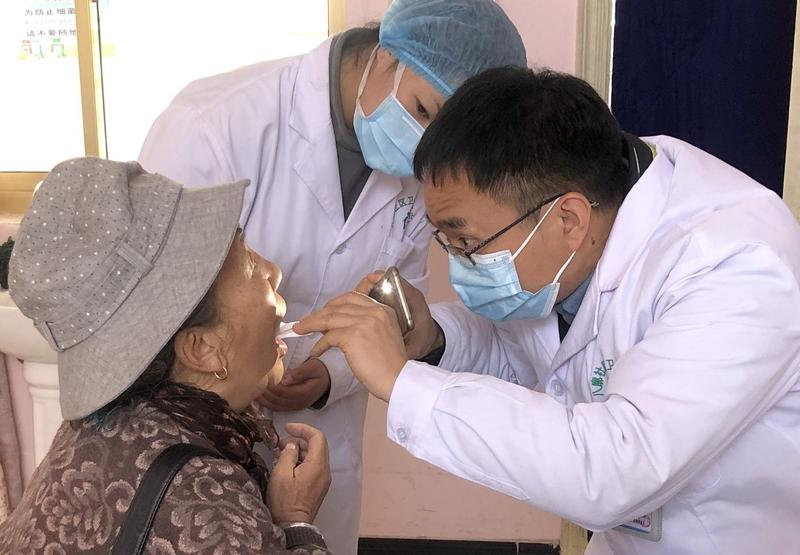 A Tibetan patient has her throat examined at the Barkor Community Health Service Center in Lhasa, Tibet, by Tao Yongkang, a Tibet-Aid physician from the China-Japan Friendship Hospital. (PHOTO PROVIDED TO CHINA DAILY)
A Tibetan patient has her throat examined at the Barkor Community Health Service Center in Lhasa, Tibet, by Tao Yongkang, a Tibet-Aid physician from the China-Japan Friendship Hospital. (PHOTO PROVIDED TO CHINA DAILY)
Tibetan doctor Siju Lhamo is grateful for medics from Aid-Tibet, who have helped her to become a more talented doctor.
Working as a Tibetan medicinal doctor in the Barkor Community Health Service Center, Siju Lhamo was familiar with providing prescriptions using Tibetan medicine, but she felt helpless while handling emergency cases because she had not received that training.
The Aid-Tibet medical aid program in the Tibet autonomous region has trained medical staff and improved treatment since it was launched in 2015
"I was taught and felt thrilled about the knowledge on emergency rescue," said Siju Lhamo.
The Aid-Tibet medical aid program in the Tibet autonomous region has trained medical staff and improved treatment since it was launched in 2015.
According to the region's health commission, the program, with help from eight major hospitals in Beijing and another 65 from around China, has assisted Tibet's eight key hospitals in increasing their medical treatment.
READ MORE: Medical aid boosts Tibet and Xinjiang healthcare
Because of the program, over 2,000 local medical professionals, including Siju Lhamo, have improved their skills over the past five years. Further, nearly 400 severe diseases can now be treated in the region's hospitals, which saved thousands of lives.
In addition, 164 departments have been added to the region's key hospitals, including departments specializing in cardiovascular disease, gynecology, obstetrics, pediatrics and orthopedics.
Yan Li'e, head nurse of the West Campus of China-Japan Friendship Hospital in Beijing, has been an Aid-Tibet supporter for two years in the Barkor Community Health Service Center of Lhasa, together with 15 other Aid-Tibet medical workers.
"I am proud and pleased to have worked in Tibet and to see the improvements and achievements," she said.
Yan said that over the past two years, the medical team has provided 190 training sessions for local staff, far beyond the target set by the National Health Commission
"I think it's very important to have good communication with the local staff from the beginning. By knowing each other better, we can have an idea of what they need, and then we will know what we can do for them."
Yan said that over the past two years, the medical team has provided 190 training sessions for local staff, far beyond the target set by the National Health Commission.
Of all the training, Yan said, emergency rescue was the most crucial and impressive.
"The knowledge of emergency rescue in narrow streets is important, so all the center's 25 workers were required to get instruction and participate in drills," she said.
Local medics also had the opportunity to train in other provinces-Siju Lhamo, for example, was dispatched by her center to study for more than a month at the China-Japan Friendship Hospital in Beijing in 2019.
"I was taught about cardiac color ultrasound and the countermeasures for flu and new infectious diseases. The opportunity to study in Beijing aroused my learning about fields other than traditional Tibetan medicine," she said.
ALSO READ: Surveyor rises to occasion again in Tibet
The Aid-Tibet medical team also donated a lot of medical equipment to the center, covering tests in echocardiography and fetal heart monitoring.
Over the past two years, the Aid-Tibet medical team has gained many friends in the surrounding communities by making home visits.
"Every time we visit Tsamla, a senior Tibetan woman who is very friendly, she gives us Tibetan butter tea and candies," Yan said.
"I don't know quite how to describe the relationship, except to say that this is what we call real love."


